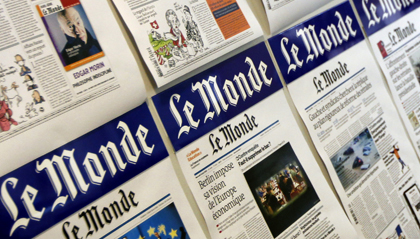The newspaper Le Monde against the Elysée Palace, the office of the president of the French Republic: Two of France’s main symbols of influence and power are facing each other in a judicial battle that promises to be a litmus test in the running battles between the press and Nicolas Sarkozy’s so-called “imperial presidency.”
Earlier this week, Le Monde, the most prestigious French newspaper, announced the imminent filing of a lawsuit accusing the office of the president of unlawfully using the intelligence services to identify a source for its reporter Gérard Davet. He had been covering an influence-peddling scandal involving key members of the ruling center-right party UMP (Union for a Popular Movement).
In the last few months, the French government has been embroiled in a growing controversy over its links to France’s wealthiest woman, Liliane Bettencourt. An avalanche of press stories, particularly in Le Monde, have alleged, among other charges, that the heiress of the L’Oreal company has illegally funded the UMP and benefited from privileged tax rebates.
The case directly implicates the president, the alleged beneficiary of Liliane Bettencourt’s largesse during the 2007 presidential campaign, and the current Labor minister, Eric Woerth, who was the party treasurer at the time and whose wife has been hired by the company managing Bettencourt’s fortune.
To most observers, this politico-financial “affaire” is a time bomb. It has already forced the president to announce a major ministerial reshuffle in the coming weeks and it might determine the fate of the center-right in the 2012 general elections.
French journalists are particularly anxious to protect themselves and their sources from government spying. There have been too many cases of government-ordered and politically motivated wiretapping of journalists, most notably of Le Monde‘s editor in chief Edwy Plenel in the 1980s under French socialist President François Mitterrand. The French press sees the protection of sources as an essential factor in its freedom to investigate and expose wrongdoing in high places.
In January, after years of campaigning by the media the French Parliament, with the support of the president, adopted a law on the confidentiality of sources in conformity with the European Convention of Human Rights that penalizes such inquisitorial methods as used by the secret services.
The Elysée Palace has rejected all of Le Monde‘s claims and supporters of the government insinuate that the paper, which has been recently purchased by center-left-leaning financiers, is playing partisan political games.
For the embattled French president, this legal arm-wrestling with the “newspaper of record” comes at the worst of times. France has just been sternly reprimanded by the European Parliament and the European Commission for its rough repatriation of Romanian Roma. Successive public opinion polls have shown that the Bettencourt-Woerth saga has undermined the president’s popularity among its core conservative constituency and weakened the government in its capacity to push through its reform program.
For some of the press this “Sarkogate” is “payback time.” Since the start of the Quinquennat (the presidential five-year term) French journalists have been roiled by a series of presidential interventions in the press. Le Monde‘s lawsuit is therefore considered as the occasion to roll back the government’s pretension to guide and discipline the media.
According to the Paris paper, the alleged whistleblower–whose name has been identified by the intelligence services–a magistrate in the Justice Ministry, has been sent by the French authorities on a mission to Guyana, a French overseas territory in South America, that used to be the site of France’s most brutal penal colony.
Ironically, Guyana was also one of the most famous battlegrounds in the history of French journalism. The name of France’s most prestigious press prize (Prix Albert Londres) recalls the dogged and successful campaign launched by star reporter Albert Londres in the 1920s to close the infamous penitentiary in French Guiana’s capital, Cayenne.
